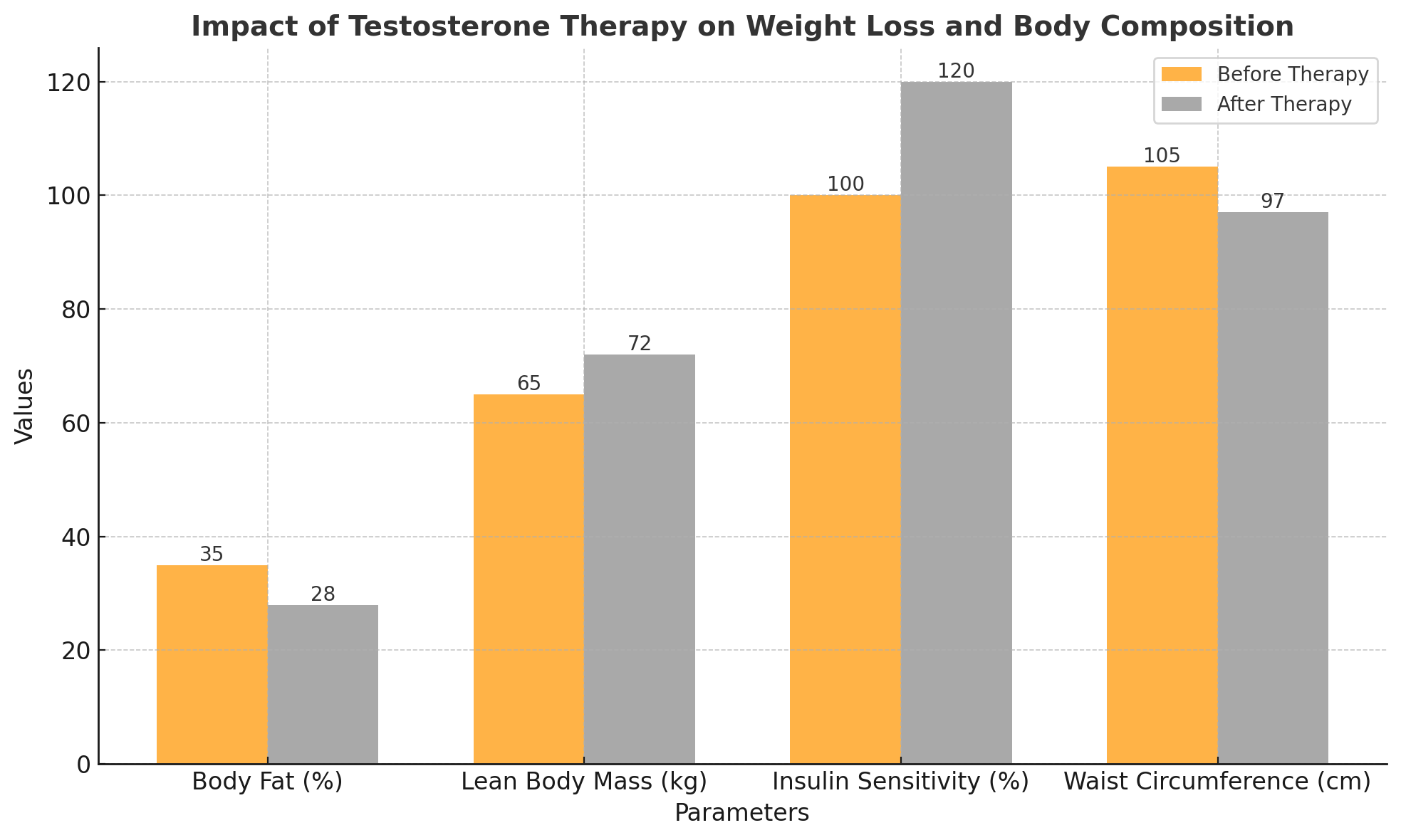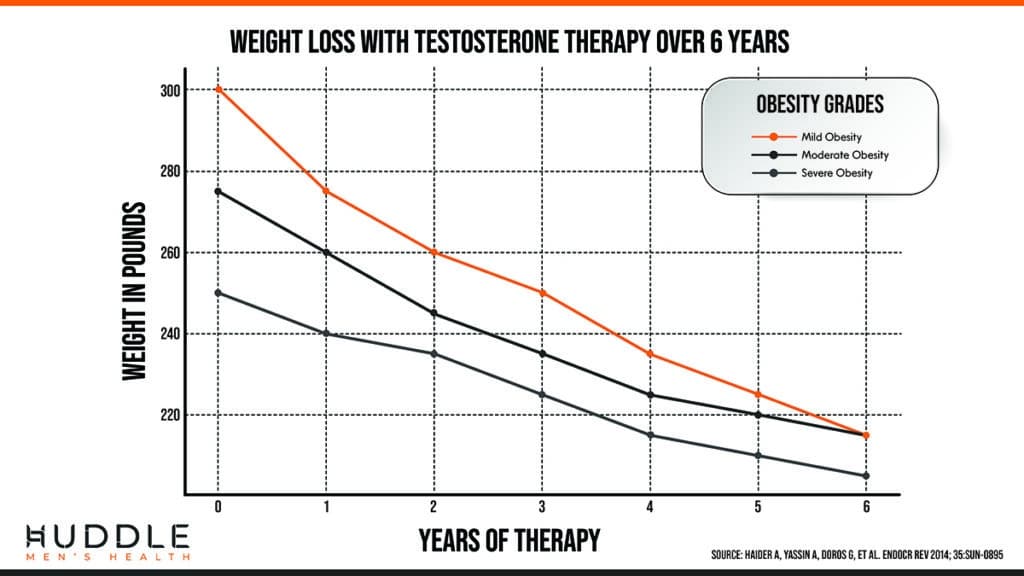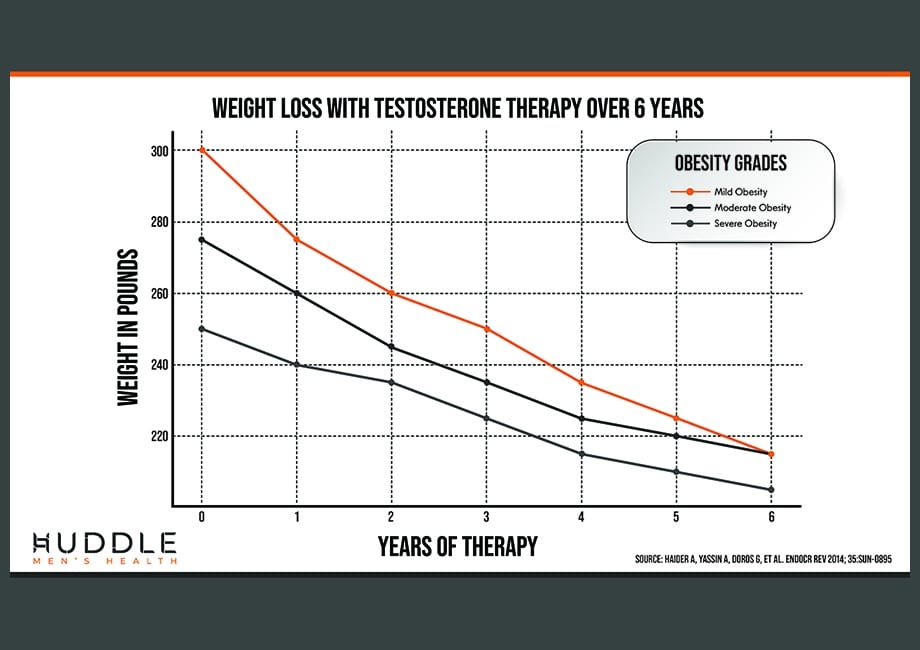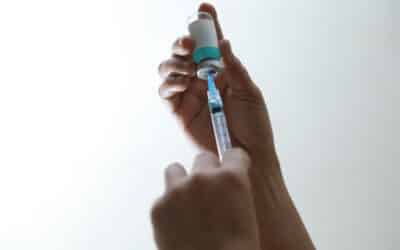Did you know that men with low testosterone are 52% more likely to struggle with weight gain, according to a study by the Endocrine Society?
When most guys hit their 40s, they can’t seem to lose weight despite regular workouts – now many are discovering that low testosterone is the culprit.
Body mass index (BMI) is often used to categorize individuals in clinical studies focused on weight loss and testosterone treatment effects.
If you’re feeling stuck in your own weight loss journey, understanding how testosterone impacts muscle mass, metabolism, and fat storage might be the game-changer you’re looking for. Here’s everything you need to know about how testosterone levels influence weight—and whether testosterone therapy could help you reach your goals.
Key Takeaways:
- Low T and Weight Gain: Men with low testosterone are 52% more prone to weight gain, especially in the midsection (Endocrine Society).
- Obesity Lowers Testosterone: Excess belly fat converts testosterone to estrogen, creating a cycle of low T and weight gain.
- Therapy’s Impact: Testosterone therapy can help men lose up to 30 kg and reduce waist size by 10-14 cm.
- Lifestyle Matters: Combining testosterone therapy with diet and exercise offers the best results for lasting weight management.
The Testosterone/Health Connection
Testosterone is a crucial hormone that plays a vital role in maintaining muscle mass, bone density, and sex drive in men. However, low testosterone levels, also known as hypogonadism, can lead to various health issues, including obesity, decreased muscle mass, and reduced libido. In recent years, testosterone therapy has gained attention as a potential treatment for obesity in men with testosterone deficiency. This article aims to examine the effects of testosterone therapy on weight loss and body composition in obese men with testosterone deficiency.
How Does Low Testosterone Affect Weight?
Low testosterone levels can disrupt metabolism and contribute to weight gain. With less testosterone, muscle mass diminishes, and because muscle burns more calories than fat mass, reduced muscle makes it harder to lose weight and easier to gain it.
| Impact Area | Effect of Low Testosterone |
|---|---|
| Muscle Mass | Decreases, leading to slower metabolism |
| Fat Storage | Increases, especially around the midsection |
| Metabolism | Slows down due to lower muscle mass |
| Hormone Balance | Belly fat converts testosterone to estrogen, further reducing T levels |
The Muscle-Fat Cycle: Lower testosterone can lead to muscle loss and increased fat storage, making weight management difficult. This cycle becomes self-perpetuating since obesity itself can further lower testosterone levels. Belly fat, in particular, contains aromatase—an enzyme that converts testosterone into estrogen—adding to the problem and further lowering testosterone.
Research Insight: Studies show that low testosterone can directly contribute to weight gain, especially around the midsection. For those with a deficiency, restoring testosterone levels could play an essential role in achieving better weight control and muscle maintenance.
The Science Behind Testosterone and Weight Loss
Testosterone is a steroid hormone produced primarily in the testicles in men and, to a lesser degree, in the ovaries in women. It plays a key role in regulating muscle growth, bone density, and sex drive. Research has demonstrated that testosterone levels are inversely related to body fat percentage, meaning higher testosterone levels are associated with lower body fat. Additionally, testosterone boosts muscle mass and strength, which can elevate metabolism and support weight loss.
Research and Studies
Numerous studies confirm the positive impact of testosterone therapy on weight loss and body composition in men with testosterone deficiency.

- Study 1: A randomized, double-blind, placebo-controlled trial published in the Journal of Clinical Endocrinology & Metabolism found that testosterone therapy significantly reduced body fat percentage and increased lean body mass in obese men with testosterone deficiency.
- Study 2: Another study in the European Journal of Endocrinology noted improvements in metabolic health, including enhanced insulin sensitivity and favorable changes in lipid profiles, following testosterone therapy in obese men.
“Testosterone plays an essential role in regulating body fat and muscle mass,” explains Dr. Shalender Bhasin, Director of the Research Program in Men’s Health at Brigham and Women’s Hospital. “Studies show that therapy can have a substantial effect on reducing fat mass and improving metabolic function, which is particularly helpful in obese men with low testosterone.”
(Source: Bhasin, S. Effects of Testosterone Supplementation on Body Composition and Muscle Performance. J Clin Endocrinol Metab.)
Can Testosterone Therapy in Men Help with Weight Loss?
Research indicates that testosterone therapy in men may aid weight loss, improve muscle mass, and support a healthier body composition, particularly in men with low testosterone.
Men undergoing testosterone therapy have also experienced a significant reduction in waist circumference, which is a key indicator of improved body composition.

Body Composition Benefits: Men undergoing testosterone therapy have reported notable weight loss (17-30 kg) and waist reductions of 10-14 cm, alongside an increase in lean muscle. This is due to the hormone’s role in enhancing mitochondrial function, which boosts energy and motivation, making physical activity—and, consequently, weight loss—easier.
Long-Term Advantages: For men diagnosed with low testosterone (hypogonadism), therapy may offer long-term benefits for weight management and overall health. However, it’s a solution best reserved for those clinically evaluated and found to have a genuine deficiency.
Lifestyle Modifications and Testosterone Therapy
While testosterone therapy may be effective in promoting weight loss and improving body composition, lifestyle modifications are also essential for achieving and maintaining weight loss. A healthy diet and regular exercise can help increase testosterone levels and improve overall health. Additionally, stress management and adequate sleep are crucial for maintaining healthy testosterone levels.
Combining lifestyle modifications with testosterone therapy may lead to more significant weight loss and improved body composition in obese men with testosterone deficiency.
Learn more in our Complete Guide: How to Optimize Your Health With Testosterone Replacement Therapy (TRT).
Risks and Considerations of Testosterone Therapy in Men
While testosterone therapy has benefits, it also carries certain risks, particularly if used without a diagnosed need.
Potential Side Effects: Misuse or overuse of testosterone can lead to sleep apnea, prostate enlargement, and reduced sperm production, highlighting the importance of professional guidance.
Importance of Proper Evaluation: Only men with a confirmed symptomatic testosterone deficiency should consider therapy. Professional evaluation ensures that therapy is safe and effective, with close monitoring for any side effects.
Lifestyle is Still Key: Even with therapy, diet and exercise are crucial to maximizing benefits and achieving sustainable weight loss. Incorporating lifestyle changes with therapy provides the best chances for long-term success.
If you’re considering testosterone therapy, it’s essential to consult a healthcare provider for personalized guidance and supervision.
In Conclusion
Testosterone can significantly influence weight management, particularly for men with low levels. Testosterone supplementation can be an effective strategy for men with low testosterone levels to achieve weight loss and improve overall health. While testosterone therapy might support weight loss, muscle gain, and overall health, it’s not a universal solution. Success depends on balancing therapy with healthy lifestyle choices. For those exploring this route, a conversation with a hormone specialist can provide insight into whether testosterone therapy is the right fit.
FAQs on Testosterone Therapy and Weight Loss in Men
Can testosterone therapy help men with testosterone deficiency lose weight?
Yes, testosterone therapy has been shown to aid weight loss in men with testosterone deficiency, particularly in obese men. Studies indicate that it can reduce fat mass, increase lean muscle mass, and improve metabolism, all of which contribute to healthier body composition.
What are the effects of testosterone therapy in obese men?
In obese men with testosterone deficiency, testosterone therapy can lead to significant improvements in body composition, including a reduction in fat mass, enhanced muscle mass, and lowered waist circumference. Research, including randomized double-blind placebo-controlled trials, suggests that testosterone therapy may also improve metabolic parameters such as insulin sensitivity.
How does testosterone therapy impact waist circumference and BMI?
Testosterone therapy has been linked to reductions in waist circumference and improvements in BMI, especially in obese men. By increasing muscle mass and reducing fat storage, testosterone therapy helps improve overall body composition, making it easier for men with low testosterone to achieve a healthier BMI and waist measurement.





